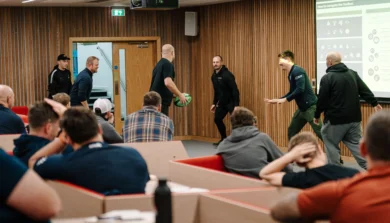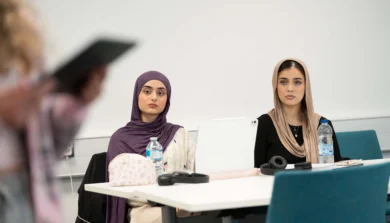BA (Honours) Secondary Education Humanities (History, Geography and RE) 11-16 with Post 16 enhancement (with recommendation for QTS)
Undergraduate
- Start date
- –
- Study mode
- –
- Course length
- –
- UCAS Code
- –

Interested in a different start date?
If you’re hoping to become a secondary school teacher in English, Maths, Science with Physics, Chemistry or biology, Religious Education, PE or Humanities you could qualify within three years through this undergraduate degree route.
Our BA (Hons) Secondary Teaching (QTS) courses offer you a gateway into the teaching profession as a qualified secondary teacher with a recommendation for Qualified Teacher Status (QTS), allowing you to teach in England and Wales.
Humanities encompasses the disciplines of Geography, History and RE as well as the commonalities that unite all of them. Whilst each of these subjects has its own separate identity, all of them are broadly about studying aspects of life and the human experience.
You will develop an understanding of the individual character of each of the three subjects and how to teach the substantive knowledge (content) of them as well as the disciplinary knowledge (skills) related to each.
The course aims to give you a grounding in each of the three subjects, but also allow you to choose a primary specialism from amongst them in order to equip you as both a specialist but also someone who can teach out of their subject.
You will also spend in total a 120 days of the course on school placement developing your practice in order to become an inspirational secondary teacher.
Birmingham Newman University has been training teachers for over 50 years and we look to train employable professionals who can make a difference.
You will be taught by experienced education specialists and our dedication to small teaching groups allows you develop strong professional relationships with the University teaching team. You will also be supported by our strong relationships with our local partner schools.
On this course you will:
Be recommended for Qualified Teacher Status which allows you teach in secondary schools in England and Wales.
Understand fundamental areas of your chosen subject as well as effective ways to teach the subject within a classroom environment.
Provide you with the skills and knowledge to become an outstanding and professional teacher.
Develop your skills and abilities in both a subject and pedagogical context and through dedicated placements in secondary schools make connections between the theories and your applied practice.
Be provided with a range of enhancement opportunities to support your training and development.
The Undergraduate programme has both a pedagogical and practical aspect. Over the three years you will have regular placements, equating to a minimum of 120* days in school, where you will develop your understanding of the subject alongside the professional skills required to teach.
In addition to your main school placements, you will have the opportunity to experience post-16 education, primary school settings and alternative placements.?Furthermore, you will develop the skills required to enhance your own professional understanding and develop your own areas of professional interest.

Got a question you’d like to ask?
Entry requirements
We welcome students from all backgrounds and accept a wide range of qualifications. If yours aren’t listed, don’t worry – our Admissions Team can help you explore your options. See full entry requirements.
• A-Level: Grade profile of BBC or 112 UCAS Tariff Points in the named degree subject area.
• BTEC: Grade profile of DMM. This can be achieved from either an Extended National Diploma or a combination of smaller BTEC qualifications.
• T-levels: A T-level with an overall Merit grade.
Specific GCSE requirements:
• GCSE/IGCSE English language and maths grades 9-4/A*-C or equivalent
If English is not your first language, you must have the following IELTS score:
· Foundation courses: A Secure English Language Test equivalent to IELTS 5.5 IELTS with a minimum of 5.5 in each component.
· Undergraduate courses: A Secure English Language Test equivalent to IELTS 6.0 with a minimum of 5.5 in each component.
Other English language qualifications are also accepted. Please contact admissions for further information.
Non-Academic Requirements:
Success at Interview. The Admissions team will use the course entry requirements, as well as your personal statement, reference and any work experience information, to shortlist and invite successful candidates for interview. Candidates will be assessed at interview on their motivation and understanding of the role of a teacher.
Occupational Health Clearance. Candidates must receive a satisfactory occupational health clearance prior to commencing the course.
DBS Clearance. Candidates must receive a satisfactory Disclosure and Barring System check prior to commencing the course.
Please contact Admissions if you have any questions.
Course fees
The tuition fee for academic year 2025/26 is: £9,535
Fees for the 2026/27 academic year are subject to change and will be published here on 9 February 2026.
Additional costs
The University will review tuition fees and increase fees in line with any inflationary uplift as determined by the UK Government, if permitted by law or government policy, in subsequent years of your course. It is anticipated that such increases would be linked to RPI (the Retail Price Index excluding mortgage interest payments).
Check out our blog/news/events

Vice-Chancellor Professor Jackie Dunne awarded MBE in New Year Honours
Vice-Chancellor of Birmingham Newman University receives an MBE for services to Higher Education.

Birmingham Newman University Celebrates Staff Achievements at Annual Awards
Birmingham Newman University celebrates its staff at the Annual Staff Awards Celebration.

North Midlands RFU and Birmingham Newman University Join Forces to Support Grassroots Rugby Coaching
Birmingham Newman University hosts landmark rugby coaching event.

Andrew Csizmadia Named Fellow of the British Computer Society for Excellence in Computing Education
Andrew Csizmadia SFHEA, Emeritus Fellow in Computing Education at Birmingham Newman University, has been appointed…

Birmingham Newman University Exceeds Fundraising Goal with British Heart Foundation Partnership
Birmingham Newman University has achieved an incredible milestone in its ongoing partnership with the British…

Book an open day
Find out about our next open day. Book now to secure your place.
Courses we think you'll also like

BA (Honours) Secondary Education History 11-16 with Post 16 enhancement (with recommendation for QTS)
- Start date:
- September 2026

BA (Honours) Secondary Education Geography 11-16 with Post 16 enhancement (with recommendation for QTS)
- Start date:
- September 2026

PGCE Secondary Religious Education with recommendation for QTS (part-time)
- Start date:
- September 2026

PGCE Secondary History with recommendation for QTS (part-time)
- Start date:
- September 2026
